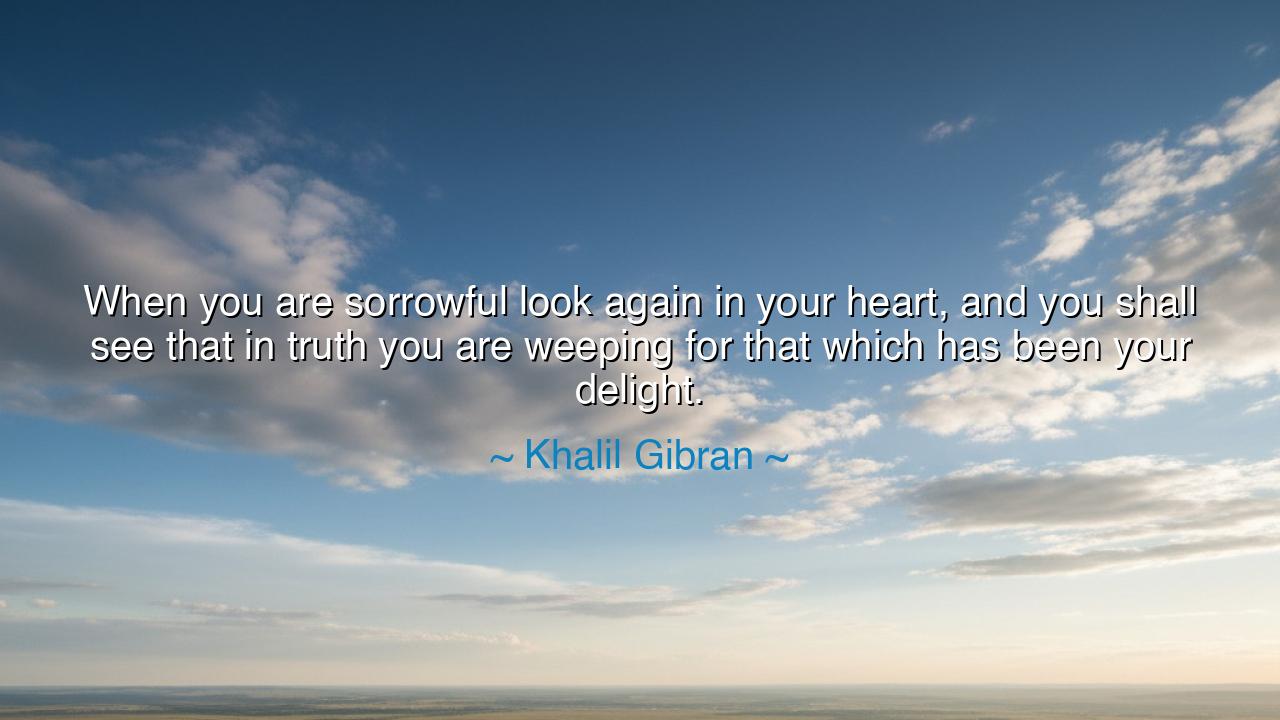
When you are sorrowful look again in your heart, and you shall
When you are sorrowful look again in your heart, and you shall see that in truth you are weeping for that which has been your delight.






"When you are sorrowful look again in your heart, and you shall see that in truth you are weeping for that which has been your delight." — Khalil Gibran. These words, like a soothing balm for the soul, call us to gaze deeper into the well of our emotions, to reflect on the true nature of our sorrow. For in times of grief, we often believe that we mourn what has been lost, what has been taken from us, but Gibran reveals a profound truth: the root of our sorrow is not the absence itself, but the love, the joy, and the delight that came before it. We grieve not only because something is gone, but because it once brought us happiness—it filled our hearts with warmth, and in its departure, we are reminded of that precious gift.
In ancient times, philosophers and sages often spoke of the dual nature of joy and sorrow, how they are two sides of the same coin. The Stoic philosopher Epictetus taught that we should not mourn what is lost, but accept the ebb and flow of life's pleasures and pains with equanimity. Yet, Gibran speaks to something deeper—that sorrow itself is not the enemy, but a reflection of the love and delight we once experienced. Sorrow, in this sense, becomes a sign of our capacity to love and cherish. It is not a burden to cast aside, but a reminder of the richness of what we had. To mourn is to acknowledge that we have truly lived, and in that mourning, we honor the joy that was.
Consider, if you will, the great tale of Achilles in Homer’s Iliad. When Achilles loses his beloved friend Patroclus, the grief he feels is not just for the loss of a companion, but for the delight they shared in life—the laughter, the camaraderie, the battles fought side by side. His sorrow is profound because their bond was precious, a light in the dark moments of war. Achilles is weeping not merely for death, but for the joy that was once so vibrant and full of life. His weeping reveals the depth of his love, and in that grief, we see the measure of the life they shared. Gibran's insight speaks to the heart of this truth: we weep for what brought us happiness, and in our tears, we give tribute to the beauty of that happiness.
This truth is further echoed in the life of King David. When his son Absalom was killed, David’s grief was all-consuming, but his sorrow was not just for the death of a son—it was for the lost delight of their relationship, for the love he had once shared with the boy. His sorrow was not just about the physical absence, but about the love that had been, and could no longer be, expressed. David’s lamentation echoes Gibran’s words: sorrow is not the loss itself, but the absence of the delight that was once there. Through his weeping, David honored the beauty of their relationship, a relationship that had been filled with love and joy, now silenced by death.
Gibran’s message, though rooted in the deepest of emotions, offers us a lesson of profound wisdom: sorrow is not something to be feared or avoided, but something to be understood. It is a reflection of the depth of our love, the richness of what we had, and the joy we once experienced. When we mourn, we acknowledge that what was in our lives was precious. We are weeping not because it is gone, but because it was, and in that weeping, we give thanks for the joy it brought. This is the paradox of human existence—the very thing that causes us pain is also that which once filled us with happiness.
In the quiet of our own lives, when we face sorrow, let us remember Gibran's words. Let us not rush to banish our grief or deny the pain of loss. Instead, let us take a moment to reflect, to look into our hearts and see the truth behind our tears. For in our mourning, we honor the delight that once was, and through that, we celebrate the fullness of life. To truly live is to experience both joy and sorrow, and in embracing both, we understand the beauty of the journey.
So, when sorrow finds you, do not run from it. Instead, embrace it, for it is a reflection of your capacity to love, to experience delight, and to live deeply. Let your tears be not a sign of weakness, but a testament to the joy that was, and the beauty that you have known. As Gibran teaches us, in the depths of sorrow, we often find the truest measure of our love and the richest meaning of the lives we have lived.






AAdministratorAdministrator
Welcome, honored guests. Please leave a comment, we will respond soon